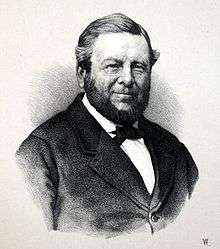Sandvik
Sandvik AB is an engineering company with approximately 40,000 employees and sales in more than 160 countries. The company was founded in Sweden in 1862. Sandvik has operations within tools and tooling systems for metal-cutting, the mining and construction industries, and manufacturing of advanced stainless steels and specialty alloys as well as products for industrial heating. In 2019, sales amounted to 103 billion SEK.

 | |
| Publicly traded Aktiebolag | |
| Traded as | Nasdaq Stockholm: SAND |
| ISIN | US800212201369 |
| Industry | Engineering |
| Founded | 1862 |
| Headquarters | Stockholm, Sweden |
Key people | |
| Products | Tools and tooling systems for metal cutting, mining and rock excavation equipment and tools, stainless steel and special alloy products |
| Revenue | SEK 103.238 billion (2019)[1] |
| SEK 13.386 billion (2019)[1] | |
| SEK 8.728 billion (2019)[1] | |
| Total assets | SEK 120.423 billion (2019)[1] |
| Total equity | SEK 61.858 billion (2019)[1] |
Number of employees | 40,235 (2019)[1] |
| Website | home.sandvik |
History
The beginning
The company was founded by Göran Fredrik Göransson in 1862. He was the first in the world to produce good quality steel using the Bessemer process on an industrial scale (Sir Henry Bessemer's patented process for steel production). The company started as Högbo Stål & Jernwerks AB in Sandviken, Sweden and was later reconstructed as Sandvikens Jernverk (Ironworks) AB in 1868. The Sandvik brand name was officially used for the first time in 1876 when Sandvik began selling products in the USA. Sandvikens Jernverk was introduced on the Stockholm Stock Exchange in 1901.
In the 1860s, sales were conducted through trading houses in Sweden, Norway, Denmark, the UK, Russia, Germany and France. In 1914 the company opened its first sales subsidiary in the UK. This was the start of a long period of expansion as subsidiaries were opened around the world.
Early years
Sandvikens Jernverk introduced the first seamless tubes made of stainless steels on the market in 1924 and by 1934 was the first in Europe to perform pilgering of tubes on an industrial scale. The Second World War forced the company to reorganize production. In 1942, the Sandvik Coromant brand was established and the first cemented-carbide tools for metalworking were manufactured a year later. Bessemer steel production was discontinued in 1947.
By 1967 Sandvikens Jernverk had 40 subsidiaries and sales in 100 countries. The company changed its name to Sandvik AB in 1972 and many new factories and acquisitions followed, including Osprey. Cemented carbide production took off and the first rotoform equipment was developed.
1980–2000
Sandvik experienced a substantial decline in 1982-1983 and in 1983 the company recorded its first loss in 62 year. Restructuring measures, a new, decentralized organization and focus on strong areas brought earnings and profitability back on track in only a couple of years.
Sandvik began investing in Eastern Europe in 1989 and subsidiaries and plants were opened in Eastern Europe and Asia throughout the 1990s, including a subsidiary in Beijing, China in 1993.
In 1994, Sandvik became the first in the world to produce diamond-coated carbide cutting inserts on an industrial scale. Safurex®, a high-alloy duplex stainless steel, was developed in 1996. In 1999, Sandvik divested its Saws and Tools business areas.
2000 to present
Automation and remote control of mining equipment, Automine, was introduced in mines in Canada and Sweden in 2001. In 2004, Sandvik's Kanthal division developed the production of high-temperature alloys via powder metallurgy. In 2002, Sandvik acquired a majority shareholding in German tool manufacturer Walter and Austrian tungsten producer Wolfram Bergbau und Hüttenwas acquired in 2009. In 2014, Sandvik companies Dormer, Safety, Impero and Pramet came together to create Dormet Pramet.
In 2016, Sandvik introduced a new strategy based on decentralization and decision-making close to customers. In 2017, the divestments of Process Systems and Mining Systems were completed.
Global customers
Sandvik manufactures and sells products and services to customers worldwide, mainly in the mining, engineering, automotive, energy, construction, and aerospace sectors. In 2019, Europe accounted for 37 percent of the company's market share, followed by North America (23%), Asia (19%), Africa/Middle East (9%), Australia (7%) and South America (5%).
Business areas
Sandvik Machining Solutions manufactures tools and tooling systems for metal cutting. The business area holds several brands that offer their own products and services, such as Sandvik Coromant, Seco, Dormer Pramet and Walter. The business area also comprises the areas additive manufacturing and digital manufacturing.
Sandvik Mining and Rock Technology supplies equipment, tools, service and support for the mining and construction industries. This includes rock drilling and cutting, crushing and screening, loading and hauling, tunneling, quarrying and demolition work.
Sandvik Materials Technology develops and manufactures products made from stainless steels and special alloys, including tubular products, bar and strip. The business area also supplies products for industrial heating.
Digitalization
Sandvik is expanding further in digital manufacturing and started the Applied Manufacturing Technologies division within Sandvik Machining Solutions in 2018.
See also
- List of Swedish companies
References
- "Annual Results 2019". Sandvik. Retrieved 13 March 2019.
Further reading